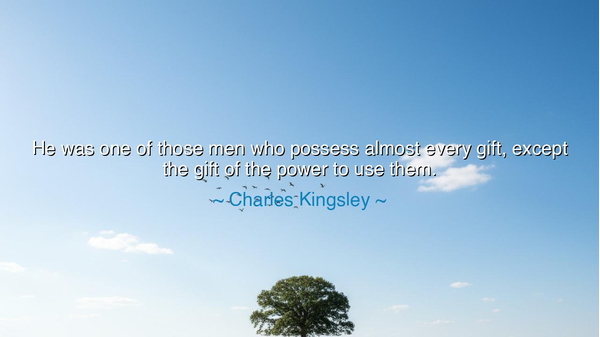
He was one of those men who possess almost every gift, except the
He was one of those men who possess almost every gift, except the gift of the power to use them.






When Charles Kingsley wrote, “He was one of those men who possess almost every gift, except the gift of the power to use them,” he captured a tragedy as old as humankind itself — the sorrow of wasted potential. His words speak of those who are brilliant in capacity but barren in action, whose minds shine like a sword left forever sheathed. The world has always known such souls: men and women born with genius, talent, and vision, yet unable to turn their gifts into deeds. Kingsley’s reflection is not one of scorn, but of lament — for he understood that to have ability without will is to live forever on the edge of greatness, never stepping across the threshold.
In the ancient world, philosophers often warned of this imbalance between power and purpose. Aristotle wrote that excellence is not a possession but a practice; it is not enough to know the good, one must do it. The Greeks called this active virtue arete — the alignment of one’s gifts with one’s actions. A man of intellect who never acts is like a field rich with seed but left untended, overgrown with weeds of hesitation and fear. Kingsley’s words echo this eternal truth: that talent without discipline decays into torment, for it leaves the soul haunted by the vision of what might have been.
History is filled with such figures — brilliant minds undone by their own inertia. Consider Samuel Taylor Coleridge, poet of “Kubla Khan” and dreamer of infinite promise. His imagination soared higher than his peers, yet his will was bound by doubt and opium. His friends saw in him a mind that could have rivaled Shakespeare’s, but his life drifted between inspiration and despair. He possessed every gift, yet not the power to use them. And so his genius became a ghost, wandering between possibility and regret. Coleridge stands as a living embodiment of Kingsley’s lament — proof that the greatest curse is not failure, but unfulfilled ability.
The power to use one’s gifts is a rarer treasure than talent itself. It demands not brilliance, but resolve; not inspiration, but endurance. The world often mistakes potential for destiny, but the ancients knew better. The blacksmith’s hammer, not the ore, shapes the blade. Likewise, it is effort, not gift, that creates greatness. Kingsley reminds us that the divine spark within man is meaningless if he lets it die for lack of breath. Many men are born with the voice of poets, the hands of artists, the minds of inventors — but only those who act, despite fear and fatigue, bring their inner worlds into reality.
Even Leonardo da Vinci, one of history’s most gifted men, wrestled with this truth. His notebooks overflowed with designs, inventions, and visions centuries ahead of his time — yet he left many of them incomplete. He was haunted by perfectionism, distracted by curiosity, and unable to bring all his brilliance to fruition. And yet, unlike others, he fought against this paralysis. He painted, built, and dreamed enough to touch immortality. The lesson of Leonardo’s struggle and Kingsley’s quote is this: to master one’s gifts, one must first master oneself.
The lesson we must draw is both humbling and liberating: gifts are not guarantees. Talent is only the beginning; it must be trained, tested, and applied. The soul must learn discipline as the warrior learns the sword. Do not envy those who are naturally gifted; envy those who are relentless, for they are the ones who turn ability into achievement. To possess every gift and never use them is a quiet tragedy — but to possess one small gift and use it fully is glory.
Therefore, children of ambition, heed this truth: action sanctifies ability. If you are blessed with a gift, do not let it sleep. Speak, write, build, love — whatever your calling, use it before it withers in silence. For it is not the number of gifts that defines a life, but the courage to use them. As Kingsley teaches, the saddest fate is not to be untalented, but to be powerful in promise and paralyzed in purpose. Better to burn your light imperfectly than to keep it hidden beneath fear — for even the smallest flame, when used, dispels the darkness.






AAdministratorAdministrator
Welcome, honored guests. Please leave a comment, we will respond soon